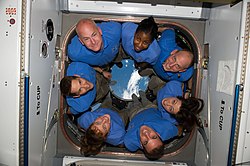
Psychological and sociological effects of space flight are important to understanding how to successfully achieve the goals of long-duration expeditionary missions. Although robotic spacecraft have landed on Mars, plans have also been discussed for a human expedition, perhaps in the 2030s,[1] for a return mission.
A Mars return expedition may last two to three years[2] and may involve a crew of four to seven people, although shorter flyby missions of approximately 1+1⁄2 years with only two people have been proposed,[3] as well as one-way missions that include landing on Mars with no return trip planned.[4][5] Although there are a number of technological and physiological issues involved with such a mission that remain to be worked out, there are also a number of behavioral issues affecting the crew that are being addressed before launching such missions. In preparing for such an expedition, important psychological, interpersonal, and psychiatric issues occurring in human spaceflight missions are under study by national space agencies and others.
In October 2015, the NASA Office of Inspector General issued a health hazards report related to human spaceflight, including a human mission to Mars.[6][7]
- ^ Kanas, Nicholas; Manzey, D. (2008). Space Psychology and Psychiatry (2nd ed.). El Segundo, California, and Dordrecht, The Netherlands: Microcosm Press and Springer.
- ^ Landau, Damon F.; Longuski, James M. (September–October 2006). "Trajectories for Human Missions to Mars, Part 1: Impulsive Transfers" (PDF). Journal of Spacecraft and Rockets. 43 (5): 1035. Bibcode:2006JSpRo..43.1035L. doi:10.2514/1.18995. Retrieved 19 November 2022.
- ^ Kaufman, Marc (1 March 2013). "Manned Mars Mission Announced by Dennis Tito Group". National Geographic News. Archived from the original on 28 February 2013. Retrieved 6 March 2013.
- ^ Mann, Adam (27 December 2012). "The Year's Most Audacious Private Space Exploration Plans". Wired. Retrieved 6 March 2013.
- ^ Krauss, Lawrence M. (31 August 2009). "A One-Way Ticket to Mars". New York Times. Retrieved 20 July 2011.
- ^ Dunn, Marcia (29 October 2015). "Report: NASA needs better handle on health hazards for Mars". AP News. Retrieved 30 October 2015.
- ^ Staff (29 October 2015). "NASA's Efforts to Manage Health and Human Performance Risks for Space Exploration (IG-16-003)" (PDF). NASA. Retrieved 29 October 2015.
© MMXXIII Rich X Search. We shall prevail. All rights reserved. Rich X Search
